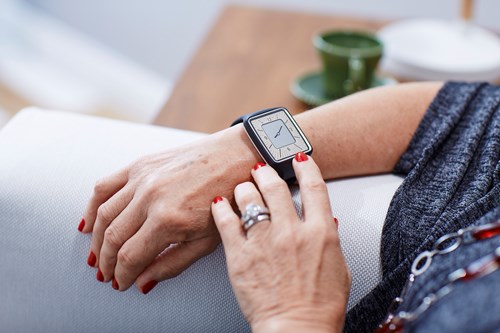 Melbourne, Australia-based Global Kinetics Corporation, maker of a wearable Parkinson’s disease monitor, has received a $7.75 million investment from the Australian Federal Government’s Biomedical Translation Fund, according to news from the Australian Financial Review that was confirmed by MobiHealthNews.
Melbourne, Australia-based Global Kinetics Corporation, maker of a wearable Parkinson’s disease monitor, has received a $7.75 million investment from the Australian Federal Government’s Biomedical Translation Fund, according to news from the Australian Financial Review that was confirmed by MobiHealthNews.
The investment came from Brandon Capital, which manages nearly half of the government fund, and will be used to commercialize its Parkinson’s KinetiGraph (PKG) wearable. The smartwatch-esque device is worn by patients over a six-to-10-day period, during which it continuously tracks involuntary movement and offers the wearer programmed medication reminders. The latest version of the device was cleared by the FDA in 2016.
“To date, Global Kinetics has provided decision support information to clinicians across 17 countries with more than three million hours of clinical data from our PKG wearable device,” Global Kinetics Corporation CEO John Schellhorn said in a recent statement. “Our company operates within a dynamic ecosystem in which new wearable devices, apps and technologies for PD care are being developed every day. However, the defining feature of our technology is that it is already used every day to help people with Parkinson’s. Target ranges are the next evolution in the use of wearables to extend the benefits of measurement to people with Parkinson’s who have the greatest need for support.”
In addition to the funding news, Global Kinetics announced today that is is the recipient of grant funding from The Michael J. Fox Foundation for Parkinson’s Research (MJFF), Shake It Up Australia Foundation, and Parkinson’s Victoria. This funding, totaling $350,000 across the three organizations, will be used to support an 18-month trial involving the company’s monitoring device that will be conducted across a number of Australian, European, and US clinical sites.
“The experience of Parkinson’s varies day to day, hour to hour,” Mark Frasier, SVP of research programs at MJFF, said in a statement. “An objective tool, such as the wearable PKG technology, that passively collects data on the lived experience of Parkinson’s disease outside the clinic could give patients and their doctors greater insight to calibrate treatment plans and improve outcomes and to give scientists a metric with which to measure therapeutic impact and test potential therapies faster.”
The Treat-To-Target study has already commenced, and aims to recruit 225 participants and is scheduled to announce findings pertaining to objective measurements and targets for device users sometime in early 2019, according to a statement. Last week, data published in Nature’s NPJ Parkinson’s Disease journal highlighted the utility of such measurements collected through Global Kinetics’ wearable monitor.



















